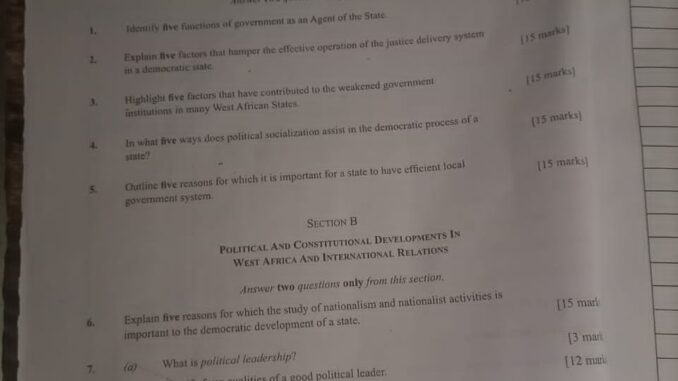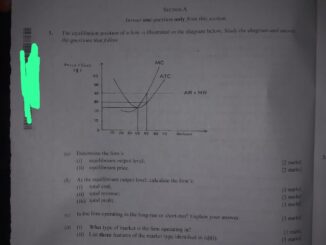
WAEC GOVERNMENT OBJ;-ExamgrandComNg
01-10: CBCCDCADCA
11-20: BCDBBCADAB
21-30: CDCBCCDACD
31-40: ABCDBBBCBA
41-50: BDCCABDCAC
COMPLETED✅
========================================
🙌🙌🙌🙌🙌🙌🙌🙌
Thursday, 8th June, 2023
Government 2 (Essay)
▪️9:30am – 11:30am
Government 1 (Objective)
▪️11:30am – 12:30pm
✅✅✅✅✅✅✅✅✅
========================================
GOVERNMENT ANSWERS;-ExamgrandComNg !!!!!
(SECTION A)
(1)
(CHOOSE ANY FIVE)
(i) Legislative Function: The government is responsible for making laws and regulations that govern the behavior of individuals and institutions within society. This includes the enactment of new laws, amending existing laws, and creating frameworks for legal and regulatory systems.
(ii) Executive Function: The government is responsible for implementing and enforcing laws and policies. It includes the execution of administrative tasks, management of public services, and the enforcement of regulations through various government agencies and departments.
(iii) Judicial Function: The government ensures access to justice and maintains a fair and impartial judicial system. It includes interpreting laws, resolving disputes, and administering justice through courts and other legal mechanisms.
(iv) Defense and Security Function: The government is responsible for protecting the nation’s borders, maintaining internal security, and defending against external threats. This includes maintaining armed forces, intelligence agencies, and law enforcement bodies.
(v) Economic Function: The government plays a crucial role in managing the economy. It involves creating and implementing economic policies, regulating financial institutions, promoting economic growth, managing public finances, and providing public goods and services.
(vi) Social Welfare Function: The government works to improve the welfare and well-being of its citizens. It includes providing social safety nets, healthcare services, education, housing, and other social programs to ensure basic standards of living and address social inequalities.
(vii) Infrastructure Development: The government is responsible for developing and maintaining infrastructure such as roads, bridges, transportation networks, utilities, and public facilities. It ensures the provision of essential services and supports economic development.
(viii) Diplomatic Function: The government represents the country in international affairs and maintains diplomatic relations with other nations. It negotiates treaties, participates in international organizations, and promotes the country’s interests and values globally.
(ix) Public Communication and Information: The government disseminates information to the public, communicates policies and initiatives, and facilitates public engagement and participation in decision-making processes.
(x) Environmental and Natural Resource Management: The government is responsible for managing and conserving natural resources, protecting the environment, and addressing issues such as pollution, climate change, and sustainable development.
=======================================
(2)
(CHOOSE ANY FIVE)
(i) Backlog of Cases: An overwhelming number of pending cases can significantly slow down the justice system. Insufficient judicial resources, including judges, court staff, and infrastructure, can lead to delays in hearings, trial proceedings, and the resolution of cases, undermining the timely delivery of justice.
(ii) Inadequate Funding: Insufficient budgetary allocations to the judiciary can impact the quality and efficiency of the justice delivery system. Inadequate funding can limit the recruitment and training of judges, infrastructure development, and the implementation of technological advancements that could streamline processes.
(iii) Corruption and Lack of Transparency: Corruption within the justice system can erode public trust and impede the effective operation of the system. Judicial corruption, including bribery, nepotism, and favoritism, can undermine the impartiality and integrity of the judiciary. Similarly, a lack of transparency in court proceedings and decision-making processes can contribute to a perception of unfairness.
(iv) Legal Complexity: Complex and lengthy legal procedures, convoluted laws, and unclear regulations can create confusion and hinder the smooth operation of the justice system. This complexity can lead to delays, increase legal costs, and pose barriers for individuals seeking access to justice, particularly for those without legal expertise or resources.
(v) Inadequate Legal Aid: Limited access to legal aid services can impede the effective functioning of the justice system, especially for marginalized and disadvantaged individuals who cannot afford legal representation. Without proper legal assistance, people may struggle to navigate the legal process, resulting in unequal access to justice.
(vi) Inefficiencies and Bottlenecks: Inefficient case management systems, outdated technologies, and administrative bottlenecks can hamper the operation of the justice system. Insufficient coordination among different actors within the system, including judges, prosecutors, defense attorneys, and support staff, can lead to inefficiencies, delays, and a lack of synchronization in the handling of cases.
(vii) Overreliance on Adversarial System: Some democratic states rely heavily on an adversarial system, where legal proceedings are adversarial in nature, with opposing parties competing to prove their case. While this system has its merits, it can also result in lengthy and costly litigation, delays, and an emphasis on winning rather than seeking truth or promoting reconciliation.
(viii) Social and Cultural Factors: Societal factors, such as biases, discrimination, and prejudice, can seep into the justice system and impede its effectiveness. These factors can affect decision-making, particularly in cases involving vulnerable groups, leading to unequal treatment and injustice.
=======================================
(3)
(CHOOSE ANY FIVE)
(i) Colonial Legacy: The colonial history of West African countries has left a lasting impact on their institutions. The colonial powers often established governance structures that were designed to serve their own interests, rather than fostering strong and accountable government institutions. This has led to legacies of weak institutions and a lack of institutional capacity.
(ii) Political Instability and Coups: Many West African states have experienced a history of political instability, including frequent coups and military interventions. These disruptions have undermined the continuity of governance, weakened institutions, and eroded public trust in government.
(iii) Weak Rule of Law: Inadequate enforcement of the rule of law is a significant challenge in the region. Corruption, political interference in the judiciary, and a lack of accountability have weakened the justice system, impeding the fair and impartial functioning of government institutions.
(iv) Limited Resources and Capacity: Economic challenges, including poverty, limited resources, and inadequate infrastructure, have constrained the ability of governments to effectively deliver services and build strong institutions. Insufficient funding, inadequate training, and a lack of skilled personnel have hampered the capacity of government institutions to perform their functions effectively.
(v) Ethnic and Religious Divisions: Deep-seated ethnic and religious divisions have often played a role in weakening government institutions. Political leaders sometimes exploit these divisions for their own gain, leading to conflicts, instability, and a breakdown of trust in state institutions.
(vi) Weak Civil Society and Limited Civic Engagement: The presence of a vibrant civil society and active citizen participation are vital for holding government institutions accountable. However, in many West African states, civil society organizations have been limited in their capacity or faced restrictions, limiting their ability to advocate for good governance and oversight.
(vii) Regional Conflicts and Cross-Border Insecurity: The prevalence of regional conflicts, insurgencies, and cross-border security challenges in West Africa has strained government institutions. These conflicts often lead to displacement, loss of lives, and disruption of governance structures, making it difficult for institutions to function effectively.
(viii) Corruption and Illicit Financial Flows: Corruption has been a pervasive issue in many West African states, diverting resources meant for development and undermining government institutions. Illicit financial flows, including money laundering and illicit trade, further weaken state institutions and hinder efforts to promote good governance and development.
=======================================
(4)
(PICK ANY FIVE)
(i) Formation of Political Values and Beliefs: Political socialization helps individuals develop their political values and beliefs, which are essential for making informed political choices. Through family, education, media, and peer groups, individuals acquire knowledge about political systems, ideologies, and policies, enabling them to form opinions and make decisions in a democratic society.
(ii) Promotion of Political Awareness: Political socialization raises awareness about political issues, events, and processes. It exposes individuals to various sources of information, such as news, debates, and discussions, which helps them stay informed about political developments. This awareness enables citizens to actively engage in political debates, analyze different perspectives, and make informed decisions during elections and other democratic processes.
(iii) Encouragement of Active Citizenship: Political socialization encourages individuals to become active participants in the democratic process. By instilling a sense of civic duty, political socialization motivates citizens to vote, join political parties or interest groups, engage in public protests, and participate in community-based initiatives. Active citizenship is vital for a functioning democracy as it ensures that diverse voices and interests are represented and considered in decision-making processes.
(iv) Fostering Political Tolerance and Pluralism: Political socialization contributes to the development of political tolerance and respect for diverse viewpoints. Through exposure to different ideologies, cultures, and perspectives, individuals learn to appreciate and accept political diversity. This tolerance fosters open dialogue, compromise, and cooperation among citizens with differing opinions, which are fundamental for the functioning of a democratic society.
(v) Generation of Political Legitimacy: Political socialization helps establish political legitimacy by cultivating citizens’ trust and confidence in democratic institutions and processes. When individuals are socialized to understand the principles and values underlying democracy, they are more likely to accept and respect the outcomes of elections, abide by the rule of law, and actively engage in civic and political activities. This legitimacy strengthens the democratic system, enhances political stability, and facilitates effective governance.
(vi) Development of Political Identity: Political socialization helps individuals develop their political identity, which is crucial for their engagement in democratic processes. Through exposure to various socializing agents such as family, education, and media, individuals acquire a sense of belonging to a particular political ideology, party, or movement.
(vii) Transmission of Democratic Values: Political socialization plays a vital role in transmitting democratic values to individuals from an early age. Family, educational institutions, and social networks help instill values such as freedom, equality, fairness, and justice, which form the foundation of democratic principles.
========================================
(5)
(CHOOSE ANY FIVE)
(i) Responsive Governance: Local government systems bring governance closer to the people. They provide a platform for addressing local needs, concerns, and aspirations more effectively. Efficient local governments can respond promptly to the specific needs and preferences of their communities, ensuring that public services and policies are tailored to local contexts.
(ii) Local Decision-Making: Local government systems empower communities to make decisions that directly affect their lives. They allow for greater citizen participation and engagement in decision-making processes. Local governments can involve citizens in shaping local policies, planning initiatives, and allocating resources, fostering a sense of ownership and democracy at the grassroots level.
(iii) Efficient Service Delivery: Local governments are responsible for providing essential public services such as water supply, sanitation, waste management, transportation, and local infrastructure. An efficient local government system ensures that these services are delivered effectively and efficiently, meeting the specific needs of the local population. Local governments are often better positioned to understand and respond to the unique challenges and demands of their communities.
(iv) Local Economic Development: Local governments play a crucial role in promoting economic development at the local level. They can implement policies and initiatives to attract investments, support small businesses, create employment opportunities, and enhance the overall economic vitality of their regions. An efficient local government system can facilitate a conducive environment for local economic growth and prosperity.
(v) Fiscal Management and Resource Allocation: Local governments are responsible for managing and allocating resources within their jurisdictions. They collect local taxes, fees, and grants, and make decisions about resource allocation based on local priorities. Efficient local government systems ensure transparent and accountable fiscal management, optimizing the use of resources to benefit the local community.
(vi) Social Cohesion and Community Building: Local governments play a crucial role in fostering social cohesion and community building. They can promote social integration, cultural diversity, and social welfare initiatives at the local level. Efficient local government systems can facilitate community participation, cooperation, and collaboration, leading to stronger social bonds and a sense of belonging among residents.
(vii) Accountability and Transparency: Local government systems provide an important mechanism for ensuring accountability and transparency in governance. Efficient local governments are more likely to adhere to principles of transparency, accountability, and good governance. They can establish mechanisms for public scrutiny, citizen feedback, and oversight, which helps build trust between the government and its constituents.
(viii) Subsidiarity and Decentralization: A well-functioning local government system aligns with the principles of subsidiarity and decentralization. It allows for the decentralization of power and decision-making, distributing authority and responsibilities to lower levels of government. This not only enhances democratic governance but also promotes efficient and effective decision-making by bringing decision-making closer to the affected communities.
=======================================
SECTION B
(6)
(CHOOSE ANY FIVE)
(i) Understanding Political Dynamics: Nationalism plays a significant role in shaping political dynamics within a state. It often influences electoral outcomes, political party platforms, and policy agendas. By studying nationalism, we can gain insights into the motivations and aspirations of different groups within society, enabling a better understanding of political processes and the factors that drive political mobilization.
(ii) Safeguarding Minority Rights: Nationalism can sometimes lead to exclusionary or discriminatory practices against minority groups. By studying nationalist activities, we can identify potential threats to minority rights and work towards ensuring inclusive and equal participation for all citizens in a democracy. It helps in creating policies and institutions that protect the rights of marginalized communities and prevent the erosion of democratic values.
(iii) Promoting Social Cohesion: Nationalism can have both unifying and divisive effects on society. Understanding the complexities of nationalist sentiments can help in fostering social cohesion and building a sense of shared identity among diverse groups. By studying nationalism, policymakers and community leaders can develop strategies to promote inclusive nationalism that recognizes the diversity of a nation while maintaining a common bond of citizenship.
(iv) Preserving Democracy: Nationalist movements can sometimes pose challenges to democratic principles and institutions. By studying the ideologies, strategies, and tactics employed by nationalist groups, we can identify potential threats to democratic processes and institutions. This knowledge can inform efforts to safeguard democratic norms, protect civil liberties, and counter any attempts to undermine the democratic system.
(v) Managing Interethnic or Intercommunity Relations: In multiethnic or multi-religious societies, nationalism can be intertwined with identity politics and intergroup tensions. By studying nationalism, policymakers and scholars can develop strategies to manage interethnic or intercommunity relations, promote dialogue, and mediate conflicts. This understanding helps in fostering an environment where diverse groups can peacefully coexist and participate in the democratic process.
(vi) Enhancing Global Perspectives: Nationalism is not limited to the boundaries of a single state. It often interacts with and influences global politics, shaping international relations, and geopolitical dynamics. Studying nationalism provides insights into the broader global context and helps in understanding the impact of nationalist movements on regional and global stability. It enables policymakers to navigate international relations effectively and promote cooperation while addressing potential conflicts arising from nationalist aspirations.
=======================================
(7a)
(PICK ANY ONE)
Political leadership refers to the role and responsibilities of individuals who hold positions of authority and influence within the realm of politics. It encompasses the ability to lead, guide, and make decisions that shape the political landscape and governance of a country, region, or community.
OR
Political leadership refers to the process and practice of guiding and influencing political processes and activities towards achieving specific goals within the realm of politics. It involves individuals who hold positions of authority or influence within political systems and who use their power to shape policies, make decisions, and mobilize support.
(7b)
(PICK ANY FOUR)
(i)Integrity: Good political leaders are honest, ethical, and demonstrate a strong sense of integrity. They act in the best interest of the public and uphold high moral and ethical standards.
(ii)Vision and Strategic Thinking: Effective political leaders have a clear vision for the future and are capable of strategic thinking. They can envision and articulate a compelling long-term direction for their country or community.
(iii)Strong Communication Skills: Good political leaders are excellent communicators. They can effectively convey their ideas, inspire others, and build consensus. They actively listen to diverse perspectives and engage in constructive dialogue.
(iv)Emotional Intelligence: Political leaders with emotional intelligence are aware of their own emotions and can manage them effectively. They also demonstrate empathy and understanding towards the needs and concerns of the people they serve.
(v)Leadership and Decision-Making: Good political leaders possess strong leadership skills. They have the ability to make informed and timely decisions, even in challenging or complex situations.
(vi)Problem-Solving and Innovation: Effective political leaders are adept at problem-solving. They can identify key issues and challenges, develop creative solutions, and take decisive action.
(vii)Resilience and Perseverance: Good political leaders exhibit resilience and perseverance in the face of adversity. They remain committed to their vision and goals, even when confronted with obstacles or setbacks.
======================================
(Choose any five(5) you wish)
(i)Economic Cooperation: Diplomacy fosters economic cooperation and trade relations between Nigeria and other nations.
(ii) Foreign Aid and Development Assistance: Diplomatic efforts enable Nigeria to engage with foreign governments, international organizations, and donor agencies to secure foreign aid and development assistance.
(iii) Political Stability and Conflict Resolution: Diplomacy facilitates peaceful resolutions of conflicts and promotes political stability.
(iii) Regional Integration and Cooperation: Diplomatic initiatives contribute to regional integration and cooperation within West Africa.
(iv) Energy Security: Nigeria is a significant oil producer and exporter.
(v) Foreign Policy Advocacy: Diplomatic engagements allow Nigeria to advance its foreign policy objectives and interests on global platforms.
(vi) Diaspora Engagement: Diplomacy facilitates engagement with the Nigerian diaspora, promoting their involvement in national development initiatives. Engaging with Nigerians living abroad can enhance investment opportunities, knowledge exchange, and skills transfer, contributing to socio-economic development.
(vii) Cultural Diplomacy and Soft Power: Diplomatic efforts that promote Nigerian culture, arts, music, and sports on the global stage enhance the country’s soft power.
(viii) Security Cooperation: Diplomatic relations contribute to security cooperation, intelligence sharing, and joint efforts to combat transnational threats such as terrorism, organized crime, and illicit trafficking.
(ix) International Education and Skills Development: Diplomacy supports educational exchange programs, scholarships, and collaborations with foreign academic institutions.
=======================================
(9)
(PICK ANY FIVE)
(i)Imposition of Colonial Rule: European powers, such as Britain, France, and Germany, imposed direct colonial rule over various West African territories during the late 19th and early 20th centuries. This resulted in the loss of sovereignty and political independence for the indigenous states and societies.
(ii)Administrative Reorganization: Colonial powers reorganized the political and administrative structures of West African territories to suit their interests. They established centralized bureaucratic systems, replacing or co-opting existing traditional systems of governance.
(iii)Creation of Artificial Boundaries: Colonial powers drew arbitrary boundaries without considering the ethnic, cultural, or historical realities of the region. This resulted in the division of ethnic groups and communities across multiple colonies, leading to fragmented and diverse political landscapes.
(iv)Emergence of Nationalist Movements: The experience of colonial rule and the denial of political rights and self-determination fueled the growth of nationalist movements. These movements sought to challenge colonial domination and fought for independence and self-governance.
(v)Political Education and Awareness: The colonial period witnessed the emergence of educated elites who received Western-style education and were exposed to political ideas such as nationalism, self-determination, and democracy.
(vi)Transition to Statehood: The political impacts of colonial administration laid the groundwork for the eventual transition to statehood. Through nationalist struggles and diplomatic negotiations, West African territories gained independence from colonial rule.
(vi)Legacy of Colonial Borders and Divisions: The artificial borders established by colonial powers have had lasting impacts on the political dynamics in West Africa. Post-colonial states have had to grapple with issues of ethnic diversity, boundary disputes, and the legacy of colonial rule, which continue to shape political realities in the region.
=======================================
QUESTION 10
(10)
(i)Widespread Corruption: Rampant corruption within the government that undermines democratic principles, weakens state institutions, and hampers public welfare.
(ii) Electoral Fraud and Manipulation: Systemic manipulation of electoral processes that undermine the fairness and legitimacy of elections, thereby eroding democratic principles.
(iii) Political Instability and Violence: Prolonged political instability, frequent violent conflicts, or civil unrest that jeopardizes public order and hinders effective governance.
(iv) Failure to Uphold the Constitution: Continuous violations of constitutional provisions by the government, such as undermining the separation of powers, disregarding civil liberties, or undermining the rule of law.
(v) Authoritarianism and Dictatorial Tendencies: The gradual erosion of democratic institutions, increasing concentration of power in the hands of a single leader or group, and the suppression of political opposition.
======================================





Be the first to comment